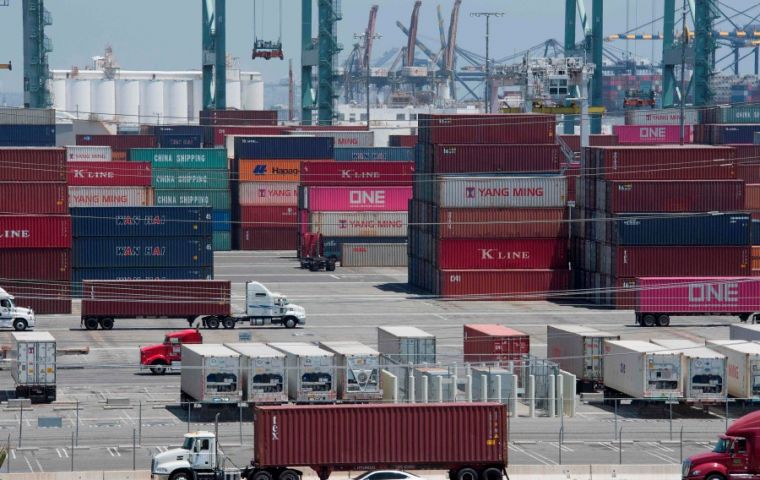MercoPress. South Atlantic News Agency
Trump slaps additional 10% punitive tariff on US$ 300 billion of Chinese goods
 The 10% duties will take effect Sep 1, and come on top of the 25% tariffs on US$250 billion in imports already in place
The 10% duties will take effect Sep 1, and come on top of the 25% tariffs on US$250 billion in imports already in place President Donald Trump announced on Thursday he will hit China with punitive tariffs on another US$300 billion in goods, escalating the trade war after accusing Beijing of reneging on more promises.
The sudden deterioration meant the world's two largest economies have now erected trade barriers covering virtually all of their US$660 billion in annual two-way merchandise trade - a prospect that confirmed economists' fears and sent shudders through Wall Street.
The 10% duties will take effect Sep 1, and come on top of the 25% tariffs on US$250 billion in imports already in place. He later raised the possibility he could increase the duties further.
“The 10% is for a short-term period and then I can always do much more or I can do less, depending on what happens with respect to a deal,” Trump said at the White House, adding, “it could be lifted up to well beyond 25%.”
After resuming face-to-face talks in Shanghai this week, trade negotiators were set to reconvene in Washington in early September for another round of discussions, which means they will take place just after the new tariffs take effect.
When he announced the tariffs on Twitter, Trump said Beijing had agreed “to buy agricultural product from the US in large quantities but did not do so”.
“Additionally, my friend President Xi said that he would stop the sale of fentanyl to the United States - this never happened, and many Americans continue to die!” Trump said, referring to the highly potent and addictive opioid.
Trade relations with China have swung between progress and disaster, appearing to collapse in May only to be revived two months later after a meeting in Japan between Trump and Xi Jinping, his Chinese counterpart.
The leaders declared a truce at that meeting in late June, but the new tariffs makes good on a threat Trump made in May.
“The core motivation is the talks clearly weren't going to go anywhere without more pressure on the Chinese,” said Derek Scissors, an expert on US-China economic ties at the American Enterprise Institute, a conservative think tank. “Of course, they could react badly now and the talks could end entirely. It's a measured risk”.
In prior tariff rounds, US officials had worked to prevent the higher costs from hitting popular consumer items.
But the new duties coming just before the holiday shopping season, will cover the vast expanse of everyday Chinese-made goods and consumer electronics - mobile telephones, baby carriages, tampons, watches and toys.
Trump has falsely claimed China pays for his mounting tariffs. But Democrats in Congress and business groups say the measures are taxing ordinary consumers and making household goods more expensive.
Wall Street dove into the red following Trump's announcement, with retailers hit particularly hard. The Dow Jones Industrial Average was closed down more than one percent. Despite the red arrows on Wall Street, Trump remained upbeat.
“I'm not concerned about that at all,” he told reporters. “I expected that.”
Washington accuses China of using a state-directed economic model, unfairly subsidizing production and stealing US technology.
But economists say the trade war has increasingly undermined the global manufacturing sector and sapped business sentiment, threatening the world's economy at a time when it is already on the wane.




Top Comments
Disclaimer & comment rulesCommenting for this story is now closed.
If you have a Facebook account, become a fan and comment on our Facebook Page!